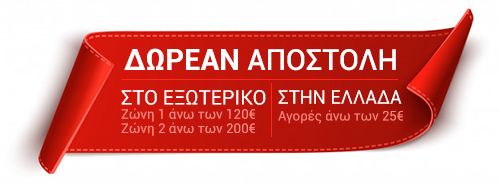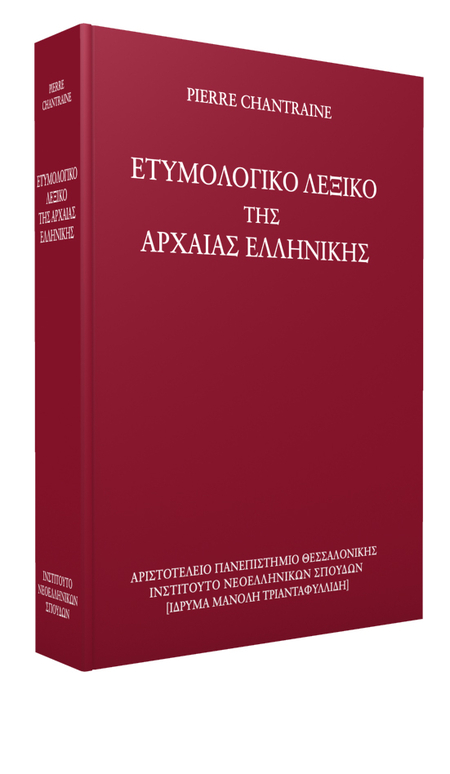Λίγα λόγια
Το Ετυμολογικό λεξικό της αρχαίας ελληνικής: ιστορία των λέξεων του κορυφαίου Γάλλου γλωσσολόγου και φιλολόγου Pierre Chantraine είναι η ελληνική μετάφραση του εγκυρότερου και πληρέστερα ενημερωμένου ετυμολογικού λεξκού της αρχαίας ελληινικής που κυκλοφορεί σήμερα παγκοσμίως.
Ως τώρα, όσο και αν φαίνεται περίεργο, ο Έλληνας αναγνώστης που ήθελε ως τώρα να προσεγγίσει επιστημονικά και ολοκληρωμένα το ζήτημα της προέλευσης του αρχαίου ελληνικού λεξιλογίου, με έκπληξη θα ανακάλυπτε ότι τα σύγχρονα έγκυρα ετυμολογικά λεξικά της αρχαίας ελληνικής, στα οποία ανατρέχουν οι φιλόλογοι, οι γλωσσολόγοι και οι σπουδαστές όλου του κόσμου, είναι γραμμένα στα γερμανικά (Hj. Frisk, Griechisches etymologisches Wörterbuch, 1954–1972, επανέκδοση 1973), στα γαλλικά (P. Chantraine, Dictionnaire étymologique de la langue grecque: histoire des mots, 1968–1980, αναθεωρημένη έκδοση 2009) και στα αγγλικά (R. S. P. Beekes, Etymological Dictionary of Greek, 2010). Η έλλειψη ενός σύγχρονου και διεθνώς καταξιωμένου ετυμολογικού λεξικού της αρχαίας ελληνικής γραμμένου στα ελληνικά οδήγησε το Ινστιτούτο στην απόφαση να μεταφράσει το μνημειώδες έργο του Pierre Chantraine.
Με δεδομένη την αξία και την επιστημοσύνη και των τριών λεξικών, το συγκεκριμένο έργο δεν δίνει βαρύτητα μόνο στην καθαυτό ετυμολογία των λέξεων της αρχαίας ελληνικής, αλλά ενδιαφέρεται εξίσου και για την ιστορία τους, δηλαδή την ιστορία του ελληνικού λεξιλογίου από τη μυκηναϊκή εποχή μέχρι το τέλος του αρχαίου κόσμου – και συχνά μέχρι σήμερα. Αυτός ήταν ο πρώτος λόγος που επιλέχθηκε ανάμεσα στα τρία. Ένας δεύτερος λόγος ήταν ότι από το 1996 το συγκεκριμένο λεξικό συμπληρώνεται με ένα «Χρονικό της ελληνικής ετυμολογίας», που δημοσιεύεται στο έγκριτο φιλολογικό περιοδικό Revue de Philologie, όπου άξιοι συνεχιστές του έργου του P. Chantraine (A. Blanc, Ch. de Lamberterie και, ως πρόσφατα, J.‑L. Perpillou) συγκεντρώνουν και δημοσιεύουν νέες απόψεις για την ετυμολογία αρχαίων ελληνικών λέξεων, επικαιροποιώντας το συνεχώς. Η ελληνική έκδοση, όπως και η αντίστοιχη γαλλική του 2009, περιλαμβάνει στο Συμπλήρωμά της τα 10 πρώτα Χρονικά, που κυκλοφόρησαν από το 1996 έως το 2005.
Η ελληνική μετάφραση συνοδεύεται από ένα εκτενές Παράρτημα, στο οποίο σκιαγραφούνται με πολύ περισσότερες λεπτομέρειες από ό,τι στο γαλλικό πρωτότυπο οι διαδρομές (επιβιώσεις και αναβιώσεις) του αρχαίου ελληνικού λεξιλογίου έως τη νέα ελληνική. Η προσπάθεια αυτή, που την είχε ξεκινήσει ήδη ο P. Chantraine, γίνεται τώρα πιο συστηματικά και ολοκληρωμένα από όσο είχε τη δυνατότητα να το πράξει ο συγγραφέας την εποχή του, αφενός επειδή τώρα διαθέτουμε περισσότερα και αξιολογότερα λεξικά της νέας ελληνικής, και αφετέρου επειδή η επιστήμη της ετυμολογίας της νέας ελληνικής έχει καταλήξει πλέον σε νεότερα συμπεράσματα.
Τη θεώρηση της μετάφρασης και τη συνολική επιμέλεια του έργου ανέλαβαν ο διευθυντής του Ινστιτούτου και καθηγητής του Α.Π.Θ. Γιώργος Παπαναστασίου (που ανέλαβε και τη σύνταξη του Παραρτήματος) και ο ομότιμος καθηγητής του Α.Π.Θ. Δημήτρης Χρηστίδης (που σε πολλές περιπτώσεις προσάρμοσε τις παραπομπές στα κείμενα των αρχαίων συγγραφέων σε πρόσφατες εκδόσεις). Ο Θανάσης Πέτρου και ο Γιώργος Δάρλας μοιράστηκαν το δύσκολο και ιδαίτερα απαιτητικό έργο της μετάφρασης, την οποία επιμελήθηκαν φιλολογικά η Ελένη Δελιαλή‑Δάπη, η Σοφία Τσολάκη και η Ειρήνη Κρίκη. Στην ελληνική μετάφραση προστέθηκε πλήρης κατάλογος με όλες τις αρχαίες πηγές (τους αρχαίους συγγραφείς και τα έργα τους, τις επιγραφές, τους παπύρους, τα όστρακα κτλ.) στις οποίες γίνεται παραπομπή στο Λεξικό.
Αξιολογήσεις
Δεν υπάρχουν αξιολογήσεις


![ΑΡΙΣΤΟΤΕΛΕΙΟ ΠΑΝΕΠΙΣΤΗΜΙΟ ΘΕΣΣΑΛΟΝΙΚΗΣ / ΙΝΣΤΙΤΟΥΤΟ ΝΕΟΕΛΛΗΝΙΚΩΝ ΣΠΟΥΔΩΝ / [ΙΔΡΥΜΑ ΜΑΝΟΛΗ ΤΡΙΑΝΤΑΦΥΛΛΙΔΗ] ΑΡΙΣΤΟΤΕΛΕΙΟ ΠΑΝΕΠΙΣΤΗΜΙΟ ΘΕΣΣΑΛΟΝΙΚΗΣ / ΙΝΣΤΙΤΟΥΤΟ ΝΕΟΕΛΛΗΝΙΚΩΝ ΣΠΟΥΔΩΝ / [ΙΔΡΥΜΑ ΜΑΝΟΛΗ ΤΡΙΑΝΤΑΦΥΛΛΙΔΗ]](https://www.eshop.ins-auth.gr/images/logos/0/logo-ins-auth-transparent.png)






